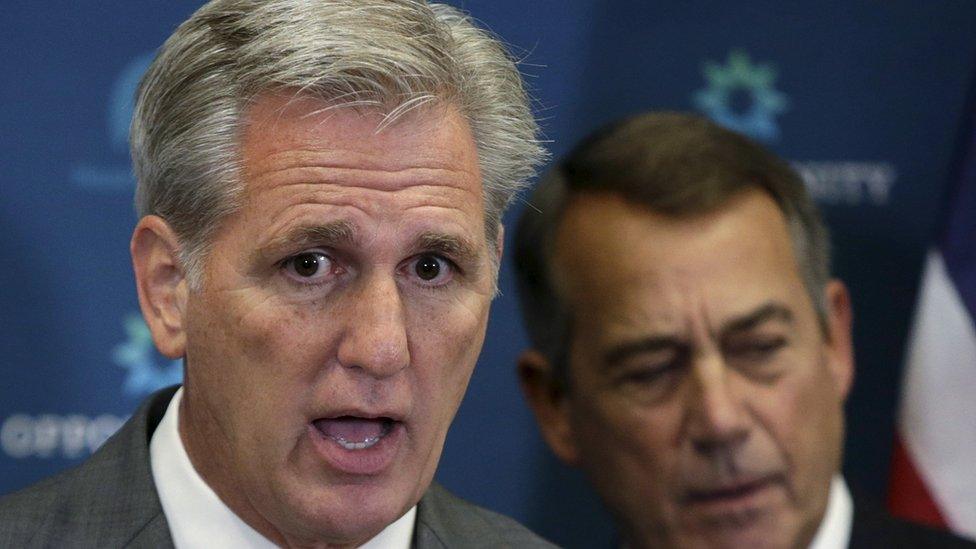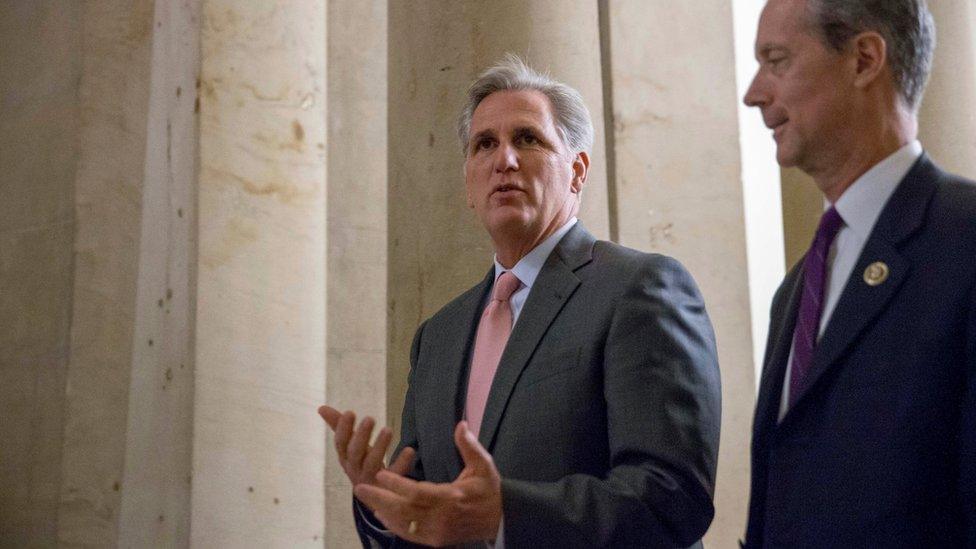Kevin McCarthy drops out of race to lead US House
- Published

Mr McCarthy was widely favoured to take over John Boehner's House Speaker slot
Republican Kevin McCarthy has dropped out of the race to be speaker of the US House of Representatives.
He told colleagues at the start of a closed meeting on Thursday that he was not the right person for the job.
Just hours before votes were due to be cast, the news has left the race to succeed John Boehner in disarray. The election has now been postponed.
Mr McCarthy was considered the favourite to take over from Mr Boehner, who quit amid party tensions.
The speaker is the third in line to the presidency and is in charge of the lower chamber of Congress.
"If we are going to unite and be strong, we need a new face to do that," said Mr McCarthy on Thursday following his announcement.
"I feel good about the decision."
He said he wants the Republican Party to be "100%" united in backing a new speaker of the House.

Analysis: Anthony Zurcher, North America Reporter, BBC News Washington

Mr McCarthy has been criticised for suggesting that the Benghazi inquiry was politically motivated
The hard-right wing of the Republican Party in the House of Representatives - the "Freedom Caucus", as its members calls themselves - has flexed its muscle once again.
First it put House Speaker John Boehner in a position where he opted to resign rather than face a challenge to his leadership. Now it has apparently blocked Mr Boehner's second-in-command, California Congressman Kevin McCarthy, from ascending to the top job.
It seems clear that Mr McCarthy just didn't have the votes to become speaker - either within the Republican House caucus or when the House, as a whole, was to weigh in later this month.
In the end, perhaps, Mr McCarthy was just too closely tied to the current, unpopular Republican establishment in the run-up to Thursday's scheduled leadership election. His comments about the House's Benghazi hearings and its goal of thwarting Hillary Clinton's presidential aspirations - only served to further undermine his speaker bid.
At this point the process of picking a replacement for Mr Boehner has been thrown into total chaos. The speaker of the House is third in line for the US presidency, but it's a post that's proving difficult for the Republican Party to fill.

Mr McCarthy is not dropping out of Congress and will stay on as House majority leader, he said.
"We fought hard to win this majority and turn this country around," he said. "I don't want to make voting for speaker a tough one."
Mr Boehner, who planned to leave at the end of October, has said he would stay on "until the House votes to elect a new speaker".
Some members of Congress have called upon House Ways and Means Committee chairman Paul Ryan to run, but he confirmed in a statement he does not plan to.
Mr McCarthy was criticised by Democrats and Republicans for suggesting that investigations into the 2012 attack on the US consulate in Benghazi, Libya which left four Americans dead were hurting Hillary Clinton's chances at the presidency.
He later said Benghazi investigations "are not political".
The House Freedom Caucus has backed Florida representative Daniel Webster for the speaker of the House slot.
Utah Representative Jason Chaffetz is the only other Republican who has said he is running.